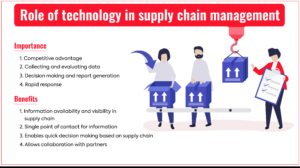As technology transcends every aspect of our personal and professional lives, it has an impact on the supply chain. The role of technology in supply chain management has been restructured by using advanced technology such as big data analytics, the internet of things, artificial intelligence, radio frequency identification, and many more. These innovations have transformed the role of technology in supply chain management from a linear one in which instructions are used to flow from supplier to producer to distributor to consumer and back to a more integrated model in which information flows in multiple directions to the supply chain.

Also read: Tech Solutions For Improving Supply Chain Management
Benefits of Technology in Supply Chain Management
Following are some of the benefits of technology in supply chain management:
1. Big Data
Big data platforms use historical sales and inventory figures as inputs to study past trends. By integrating these trends with seasonal fluctuations and other factors, the company forecasts demand for each product warehouse in locations in real-time. Hence, the role of technology in supply chain management is changing the business landscape.
2. Artificial Intelligence(AI)
This technology can be used in a couple of different ways from the kind of pre-season demand planning to merchandising and buying decisions through planning and allocation and then in-season forecasting in terms of inventory availability and assortment and what to actually make available across the role of technology in supply chain management through to then was to fulfill that inventory from across distribution centers and also stores. Also then all the way through to route optimization and even in the last mile connectivity
3. Internet of Things(IoT)
Prominent IoT devices allow the organization to build its digital visibility capabilities. The entry-level shipment tracker can be used by companies for IoT drive track and trace to connect shipment and assets throughout the supply chain. All shipment and product moments can be tracked in real-time. Data from sensors and other IoT devices can be augmented with other supply chain data such as warehouse and transactional information to provide more granular visibility.
4. Radio frequency identification(RFID)
It is a means of identifying through radiofrequency products. From the inventory management perspective, the implementation of RFID allows the user to bridge that inaccurate level from the typical 65 to 70 percent over to the 98 plus percent which means the user will know the exact and accurate information of its inventory which allows them to make the appropriate decision.
5. Cloud Computing
Cloud computing technology offers a lot of benefits, it’s flexible, it allows easy integration of partners, this information of technologies and it gives the user visibility and control. In addition to this, the implementation of this technology also gives cost benefits in terms of inventing the systems and the applications in a globally consistent way.
6. Increased Control Over Production
The role of technology in supply chain management provides improved visibility and accountability. In order to attain efficiency in the total production process, it is imperative that a manufacturing company have a clear sight of the current stage of in-production products, foresee any potential issues or delays they might face, and be able to align production schedules accordingly. The use of technology can establish the necessary transparency in the whole process. It allows manufacturing companies to have better control over product flow and information flow across the supply chain management.

7. Better Inventory Management
Maintaining an optimal level of inventory is a challenge encountered by all manufacturers. While excess inventory drives the risk of waste and an increased need for working capital funds, too less of inventory may lead to stoppages in the production cycle and of losing business through stockouts. Hence, with the role of technology in supply chain management, manufacturers can create adaptable business processes that offer flexibility to handle varied demand situations. The analytics will facilitate you to achieve financial goals with predictable success by managing your inventory and sales orders effectively.
8. Increased Collaboration Between Supply Chain Partners
With the benefits of technology in supply chain management and real-time information sharing, manufacturers can increase collaboration with their key partners. Manufacturers will also be able to track activities through the whole supply chain, with visibility into supplier end and distributor processes. Such information can aid manufacturers in creating more informed decisions and better forecast future demand. Therefore, this helps in controlling the manufacturing process and leads to lower costs through more effective decisions in procurement and contract management.
Also read: The Future Logistics & Supply Chain Technologies
Conclusion
To sum up, the above-mentioned technologies and their benefits are just the tips of the iceberg. There are a lot more benefits and a lot more technologies from which the supply chain and logistics industry will gain a ton of benefits. Furthermore, the era we are living in is one of modernization, and businesses are shifting their traditional business practices into automation in order to maximize results.
Are you looking to implement technology into your supply chain business? If yes so please feel free to contact us at support@aeologic.com
FAQs
What is the role of technology in the supply chain?
The fundamental tool for understanding the role of technology in the value chain is a competitive advantage. Also, technological change is one of the main aspects of advancing competition. Information technology systems are ubiquitous in the value chain, as each activity generates and incorporates information.
How technology can facilitate supply chain operations?
Fulfillment operations can make use of the data from IoT trackers to better pinpoint the major indicators that lead to better reliability and efficiency in their services. In case, supply chain delays occur, companies can more easily recognize the source of bottlenecks and take action to enhance processes.

Manoj Kumar is a seasoned Digital Marketing Manager and passionate Tech Blogger with deep expertise in SEO, AI trends, and emerging digital technologies. He writes about innovative solutions that drive growth and transformation across industry.
Featured on – YOURSTORY | TECHSLING | ELEARNINGINDUSTRY | DATASCIENCECENTRAL | TIMESOFINDIA | MEDIUM | DATAFLOQ









